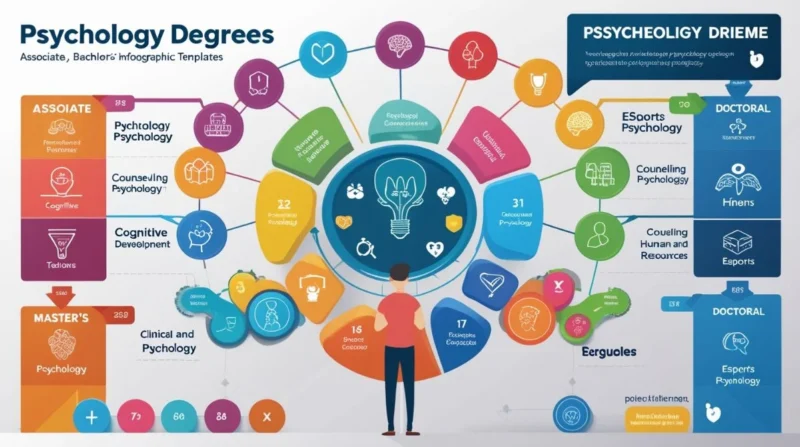Table of Contents
- What Is a Psychology Degree?
- Levels of Psychology Degrees
- Core Subjects in a Psychology Degree
- What Can You Do with a Psychology Degree?
- Understanding the Appeal of Psychology
- Diverse Applications of a Psychology Degree
- Career Opportunities with a Psychology Degree
- Emerging and Unique Career Options
- Skills Gained from a Psychology Degree
- Educational Pathways
- Master’s education and specializations in psychology
- Overview of Master’s Education in Psychology
- Common Specializations in Master’s Psychology Programs
- Curriculum Components
- Career Opportunities Post-Master’s
- Considerations for Prospective Students
- Psychology Careers Beyond the Traditional Paths
- Esports Psychology
- PsychoHairapy: Mental Health in Salons
- Experimental and Applied Psychology
- Market Research and Consumer Behavior
- Sports and Performance Psychology
- Legal and Criminal Justice System
- Education and Academic Advising
- Human Resources and Organizational Development
- Career Counseling and Coaching
- Writing and Content Creation
- Public Policy and Advocacy
- Global Demand and Opportunities
- Find the Right Psychology Field for You?
- FAQ
- Q1. How do I choose the best psychology specialization for me?
- Q2. What are the educational requirements for different psychology careers?
- Q3. Can I work in psychology without becoming a licensed therapist?
- Q4. What are some emerging fields in psychology?
- Q5. How can I gain experience in different psychology fields?
- Conclusion
What Is a Psychology Degree?
A psychology degree is an academic qualification that focuses on the scientific study of the human mind and behavior. It explores various aspects of mental processes, emotions, and actions, providing insights into how individuals think, feel, and interact with others. This degree equips students with a comprehensive understanding of psychological theories, research methods, and practical applications across diverse fields.
Levels of Psychology Degrees
1. Associate Degree in Psychology
- Typically a two-year program offered at community colleges.
- Introduces foundational concepts in psychology.
- Prepares students for entry-level roles such as psychiatric technicians or social workaides.
2. Bachelor’s Degree in Psychology
- A four-year undergraduate program.
- Covers core areas like cognitive, developmental, and social psychology.
- Graduates can pursue roles in human resources, marketing, or case management.
3. Master’s Degree in Psychology
- Requires 2-3 years of postgraduate study.
- Allows specialization in fields like clinical, counseling, or industrial-organizational psychology.
- Qualifies individuals for advanced positions in mental health services, research, or business sectors.
4. Doctoral Degrees: Ph.D. and Psy.D.
- Ph.D. (Doctor of Philosophy):
- Emphasizes research and academic scholarship.
- Ideal for careers in academia, research, or specialized clinical practice.
- Psy.D. (Doctor of Psychology):
- Focuses on clinical practice and application.
- Prepares students for licensure to diagnose and treat mental disorders.
Core Subjects in a Psychology Degree
- Cognitive Psychology: Study of mental processes like memory, perception, and problem-solving.
- Developmental Psychology: Examination of human growth and changes across the lifespan.
- Social Psychology: Exploration of how individuals are influenced by social interactions and societal factors.
- Abnormal Psychology: Analysis of atypical behaviors and mental health disorders.
- Biological Psychology: Investigation of the biological underpinnings of behavior and mental processes.
- Research Methods and Statistics: Training in designing studies, collecting data, and interpreting results.
What Can You Do with a Psychology Degree?
Psychology is the study of the human mind and behavior. It’s a field that helps in understanding how people think, feel, and act. With a degree in psychology, you’re not limited to one specific career path. Instead, you open doors to various professions that value the insights and skills psychology provides.

Understanding the Appeal of Psychology
Many students are drawn to psychology because it offers insights into themselves and others. It’s a subject that helps individuals navigate personal challenges and understand societal behaviors. Moreover, psychology equips students with critical thinking, communication, and analytical skills, making them valuable in numerous professions.
Diverse Applications of a Psychology Degree
- Human Resources: Utilize understanding of behavior to manage recruitment, training, and employee relations.
- Marketing and Market Research: Analyze consumer behavior to inform marketing strategies.
- Social Services: Support individuals and communities through counseling and program development.
- Education: Teach or develop educational materials and curricula.
- Public Health: Design interventions to promote mental and physical health.
Career Opportunities with a Psychology Degree
Clinical Psychologist
Clinical psychologists assess and treat mental, emotional, and behavioral disorders. They often work in hospitals, private practices, or mental health clinics. To become a clinical psychologist, one typically needs a doctoral degree and must be licensed.
School Psychologist
School psychologists work within educational settings to help students succeed academically, socially, and emotionally. They collaborate with teachers, parents, and administrators to create supportive learning environments.
Industrial-Organizational Psychologist
These professionals apply psychological principles to workplace challenges. They might focus on improving employee productivity, selecting the best candidates for jobs, or enhancing organizational structures.
Forensic Psychologist
Forensic psychologists intersect psychology with the legal system. They might assess individuals involved in legal cases, provide expert testimony, or work within correctional facilities.
Sports Psychologist
Sports psychologists help athletes enhance performance and cope with the pressures of competition. They work with individuals and teams to develop mental strategies for success.
Emerging and Unique Career Options
Esports Psychologist
With the rise of competitive gaming, there’s a growing demand for psychologists who understand the unique pressures faced by esports athletes. Universities are now offering degrees that combine psychology with esports to prepare professionals for this niche field.
Occupational Therapist
Occupational therapists help individuals develop, recover, or maintain daily living and work skills. A background in psychology provides a strong foundation for understanding clients’ needs and challenges.
Mental Health Advocate
With increasing awareness of mental health issues, there’s a need for professionals who can advocate for better services, create awareness campaigns, and work with communities to reduce stigma.
Skills Gained from a Psychology Degree
A psychology degree imparts various transferable skills:
- Analytical Thinking: Understanding complex behaviors and patterns.
- Communication: Effectively conveying ideas and listening to others.
- Research Proficiency: Designing studies, collecting data, and interpreting results.
- Empathy: Understanding and sharing the feelings of others.
- Problem-Solving: Developing solutions based on psychological principles.
Educational Pathways
The level of education you pursue in psychology can influence your career options:
- Bachelor’s Degree: Entry-level roles in human resources, case management, or sales.
- Master’s Degree: Positions like school counselor, industrial-organizational psychologist, or research assistant.
- Doctoral Degree: Advanced roles such as clinical psychologist, university professor, or researcher.
Licensing requirements vary by country and specialization, so it’s essential to research the specific criteria for your desired career path.
Master’s education and specializations in psychology
A master’s degree in psychology offers an opportunity to deepen your understanding of human behavior and specialize in areas that align with your career aspirations. This advanced education can lead to various professional roles in mental health, education, research, and organizational settings.
Overview of Master’s Education in Psychology
- Duration and Structure: Typically spans 2–3 years, combining theoretical coursework with practical experience.
- Degree Types: Common degrees include Master of Arts (MA) and Master of Science (MS) in Psychology.
- Licensure Preparation: Many programs prepare students for licensure as counselors or therapists, requiring supervised clinical hours and passing relevant examinations.
Common Specializations in Master’s Psychology Programs
1. Clinical Psychology
- Focus: Assessment and treatment of mental health disorders.
- Career Paths: Licensed therapists, clinical psychologists (often requiring further doctoral study), mental health counselors.
2. Counseling Psychology
- Focus: Helping individuals cope with life challenges and improve well-being.
- Career Paths: Licensed professional counselors, school counselors, career advisors.
3. Industrial-Organizational Psychology
- Focus: Applying psychological principles to workplace environments.
- Career Paths: Human resources specialists, organizational consultants, talent development managers.
4. Educational Psychology
- Focus: Understanding how people learn and retain knowledge.
- Career Paths: Educational consultants, curriculum developers, academic advisors.
5. Forensic Psychology
- Focus: Intersection of psychology and the legal system.
- Career Paths: Court consultants, criminal profilers, correctional psychologists.
6. Neuropsychology
- Focus: Relationship between brain function and behavior.
- Career Paths: Clinical neuropsychologists, research scientists, rehabilitation specialists.
7. Health Psychology
- Focus: How psychological factors influence health and illness.
- Career Paths: Health promotion specialists, behavioral health consultants, wellness coaches.
8. Developmental Psychology
- Focus: Human growth and development across the lifespan.
- Career Paths: Child development specialists, geriatric counselors, academic researchers.
9. Social Psychology
- Focus: How individuals’ thoughts, feelings, and behaviors are influenced by others.
- Career Paths: Market researchers, policy analysts, social program evaluators.
Curriculum Components
- Core Courses: Research methods, statistics, ethics in psychology, and foundational theories.
- Specialization Courses: Tailored to the chosen field, such as cognitive assessments in clinical psychology or organizational behavior in industrial-organizational psychology.
- Practicum/Internship: Supervised practical experience in relevant settings to apply learned skills.
- Thesis/Capstone Project: An in-depth research project demonstrating mastery of a specific topic within the field.
Career Opportunities Post-Master’s
- Mental Health Counselor: Providing therapy to individuals and groups dealing with various psychological issues.
- Marriage and Family Therapist: Working with couples and families to improve relationships and resolve conflicts.
- School Psychologist: Addressing students’ learning and behavioral problems in educational settings.
- Human Resources Manager: Overseeing organizational staffing, training, and employee relations.
- Market Research Analyst: Studying consumer behavior to inform marketing strategies.
- Academic Advisor: Guiding students in educational institutions on course selection and career planning.
Considerations for Prospective Students
- Accreditation: Ensure the program is accredited by relevant educational bodies.
- Licensure Requirements: Understand the licensure prerequisites in your intended state or country of practice.
- Career Goals: Align your specialization with your long-term professional objectives.
- Program Format: Consider whether full-time, part-time, or online formats suit your lifestyle and commitments.
Psychology Careers Beyond the Traditional Paths
A degree in psychology offers a versatile foundation that extends far beyond conventional roles like clinical therapy or academic research. The skills acquired, such as understanding human behavior, critical thinking, and effective communication, are highly transferable and valued across various industries. This opens up a plethora of alternative career paths for psychology graduates.
Esports Psychology
- Role: Performance Coach or Wellbeing Consultant for professional gamers.
- Overview: With the exponential growth of the esports industry, there’s a rising demand for professionals who can enhance players’ mental resilience and team dynamics. Institutions like the University of Chichester have introduced specialized degrees in esports psychology to bridge this gap.
PsychoHairapy: Mental Health in Salons
- Role: Salon Worker Trained in Mental Health Awareness.
- Overview: Initiatives like PsychoHairapy train hairstylists to recognize signs of mental distress in clients, providing “micro-counseling” skills and referral knowledge. This approach leverages the trust between clients and stylists to promote mental well-being.
Experimental and Applied Psychology
- Roles: Researcher, Psychometrician, Forensic Analyst.
- Overview: Beyond clinical settings, psychologists contribute to research in various fields, developing assessments, studying behavioral patterns, and applying findings to real-world problems in sectors like law enforcement and corporate environments.
Market Research and Consumer Behavior
- Role: Market Research Analyst.
- Overview: Understanding consumer behavior is crucial for businesses. Psychology graduates analyze market trends, design surveys, and interpret data to inform marketing strategies and product development.
Sports and Performance Psychology
- Role: Sports Psychologist or Performance Consultant.
- Overview: Athletes seek psychological support to enhance performance, manage stress, and recover from injuries. Psychologists in this field work with individuals and teams to develop mental strategies for success.
Legal and Criminal Justice System
- Roles: Forensic Psychologist, Probation Officer, Victim Advocate.
- Overview: Applying psychological principles within the legal system, professionals assess competency, provide counseling to offenders, and support victims, contributing to fair and effective justice processes.
Education and Academic Advising
- Roles: Academic Advisor, Educational Consultant, Curriculum Developer.
- Overview: Psychology graduates contribute to educational settings by developing learning materials, advising students, and implementing programs that enhance educational outcomes.
Human Resources and Organizational Development
- Roles: HR Specialist, Organizational Consultant, Training and Development Manager.
- Overview: Understanding employee behavior and motivation is key in HR. Psychologists design training programs, improve workplace satisfaction, and develop policies that foster productive work environments.
Career Counseling and Coaching
- Role: Career Counselor or Life Coach.
- Overview: Guiding individuals through career choices and life transitions, professionals use psychological principles to help clients identify strengths, set goals, and overcome obstacles.
Writing and Content Creation
- Roles: Technical Writer, Content Strategist, Behavioral Science Writer.
- Overview: With strong communication skills, psychology graduates craft content that translates complex psychological concepts into accessible information for various audiences.
Public Policy and Advocacy
- Roles: Policy Analyst, Community Outreach Coordinator, Public Health Advisor.
- Overview: Applying psychological insights to shape policies, these professionals work on initiatives that promote mental health awareness, education reform, and community well-being.
Global Demand and Opportunities
The demand for psychology professionals is growing worldwide. For instance, in Australia, there’s a notable shortage of psychologists, prompting many students to pursue this field to address the gap in mental health services.
Similarly, in the UK, the integration of psychology into emerging sectors like esports indicates the field’s adaptability and relevance in modern industries.
Find the Right Psychology Field for You?
Choosing a psychology career is a personal journey that depends on your interests, strengths, and long-term goals. Psychology is a diverse field, offering numerous paths beyond traditional therapy roles. Whether you’re drawn to research, education, business, or creative arts, there’s a niche in psychology that aligns with your passions.
Self-Assessment: Know Your Interests
Before exploring specific fields, reflect on:
- Your Passion Areas: Are you interested in mental health, education, business, or research?
- Preferred Work Environment: Do you see yourself in a clinical setting, corporate office, school, or research lab?
- Interaction Level: Do you enjoy one-on-one interactions, group settings, or behind-the-scenes work?
- Educational Commitment: Are you willing to pursue advanced degrees, or are you looking for roles accessible with a bachelor’s degree?
Exploring Psychology Specializations
1. Clinical Psychology
- Focus: Diagnosing and treating mental health disorders.
- Workplaces: Hospitals, private practices, mental health clinics.
- Education: Doctorate (Ph.D. or Psy.D.) required.
2. Counseling Psychology
- Focus: Helping individuals cope with life challenges and improve well-being.
- Workplaces: Schools, community centers, private practices.
- Education: Master’s or doctorate degree.
3. School Psychology
- Focus: Supporting students’ learning and emotional needs.
- Workplaces: Elementary and secondary schools.
- Education: Specialist or doctoral degree.
4. Industrial-Organizational Psychology
- Focus: Enhancing workplace productivity and employee satisfaction.
- Workplaces: Corporations, consulting firms, government agencies.
- Education: Master’s or doctorate degree.
5. Forensic Psychology
- Focus: Applying psychological principles within the legal system.
- Workplaces: Courts, correctional facilities, law enforcement agencies.
- Education: Master’s or doctorate degree.
6. Health Psychology
- Focus: Understanding how psychological factors influence health and illness.
- Workplaces: Hospitals, wellness centers, research institutions.
- Education: Doctorate degree.
7. Sports Psychology
- Focus: Enhancing athletic performance and motivation.
- Workplaces: Sports teams, athletic organizations, private practice.
- Education: Master’s or doctorate degree.
8. Neuropsychology
- Focus: Studying the relationship between brain function and behavior.
- Workplaces: Hospitals, research labs, academic institutions.
- Education: Doctorate degree.
9. Social Psychology
- Focus: Examining how individuals’ thoughts, feelings, and behaviors are influenced by others.
- Workplaces: Universities, research institutions, marketing firms.
- Education: Master’s or doctorate degree.
10. Developmental Psychology
- Focus: Studying human growth and development across the lifespan.
- Workplaces: Research institutions, educational settings, healthcare facilities.
- Education: Doctorate degree.
Educational Pathways
- Bachelor’s Degree: Entry-level roles in human resources, case management, or research assistance.
- Master’s Degree: Opportunities in counseling, school psychology, or industrial-organizational roles.
- Doctorate Degree: Required for clinical, counseling, and research psychologist positions.
Alternative Career Options
A psychology background is valuable in various non-traditional roles:
- Marketing Analyst: Understanding consumer behavior to inform marketing strategies.
- Human Resources Specialist: Managing employee relations and organizational development.
- Academic Advisor: Guiding students in educational institutions on course selection and career planning.
- User Experience (UX) Designer: Enhancing user satisfaction by improving usability and accessibility.
- Public Relations Specialist: Managing communication between organizations and the public.
Steps to Choose Your Path
- Self-Reflection: Assess your interests, strengths, and career goals.
- Research: Explore various psychology fields and their requirements.
- Informational Interviews: Connect with professionals in your areas of interest.
- Educational Planning: Determine the necessary degrees and certifications.
- Experience: Seek internships or volunteer opportunities to gain practical exposure.
FAQ
Q1. How do I choose the best psychology specialization for me?
Start by identifying your interests and strengths. Consider whether you prefer working directly with people, conducting research, or applying psychological principles in business settings. Reflect on the populations you want to work with, such as children, adults, or specific communities. Research various psychology fields to see which align with your goals and values.
Q2. What are the educational requirements for different psychology careers?
Educational paths vary by specialization:
- Bachelor’s Degree: Entry-level roles in human resources, case management, or research assistance.
- Master’s Degree: Opportunities in counseling, school psychology, or industrial-organizational roles.
- Doctorate Degree: Required for clinical, counseling, and research psychologist positions.
Licensure requirements also differ by state and specialty.
Q3. Can I work in psychology without becoming a licensed therapist?
Yes, there are numerous non-clinical roles in psychology. You can work in areas like market research, human resources, organizational development, or academic advising. These positions utilize psychological principles without requiring licensure.
Q4. What are some emerging fields in psychology?
Emerging fields include:
- Esports Psychology: Focusing on mental resilience and performance in gaming.
- PsychoHairapy: Training salon workers in mental health awareness.
- Forensic Psychology: Applying psychology within the legal system.
- Health Psychology: Exploring how psychological factors affect health and illness.
These areas offer innovative ways to apply psychological knowledge.
Q5. How can I gain experience in different psychology fields?
Consider internships, volunteer work, or part-time positions in various settings like schools, hospitals, or businesses. Networking with professionals and joining psychology organizations can also provide exposure to different specialties.
Conclusion
A psychology degree offers a versatile foundation for various careers. Whether you’re interested in traditional roles like clinical psychology or emerging fields like esports, the skills and knowledge gained from studying psychology are invaluable. As societal awareness of mental health continues to grow, so does the importance and applicability of psychology in diverse sectors.
Related Topics: Is Psychology a Social Science?









